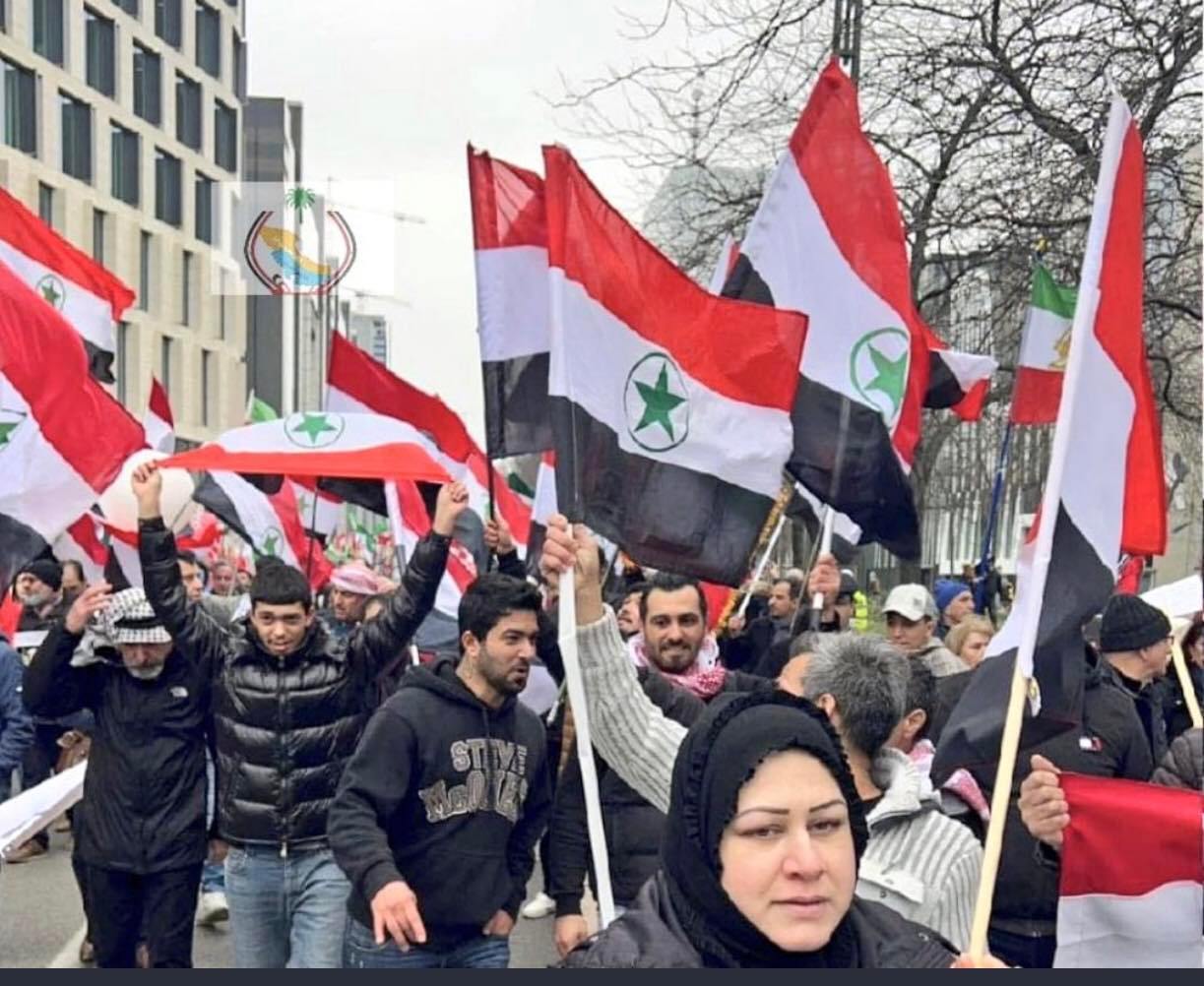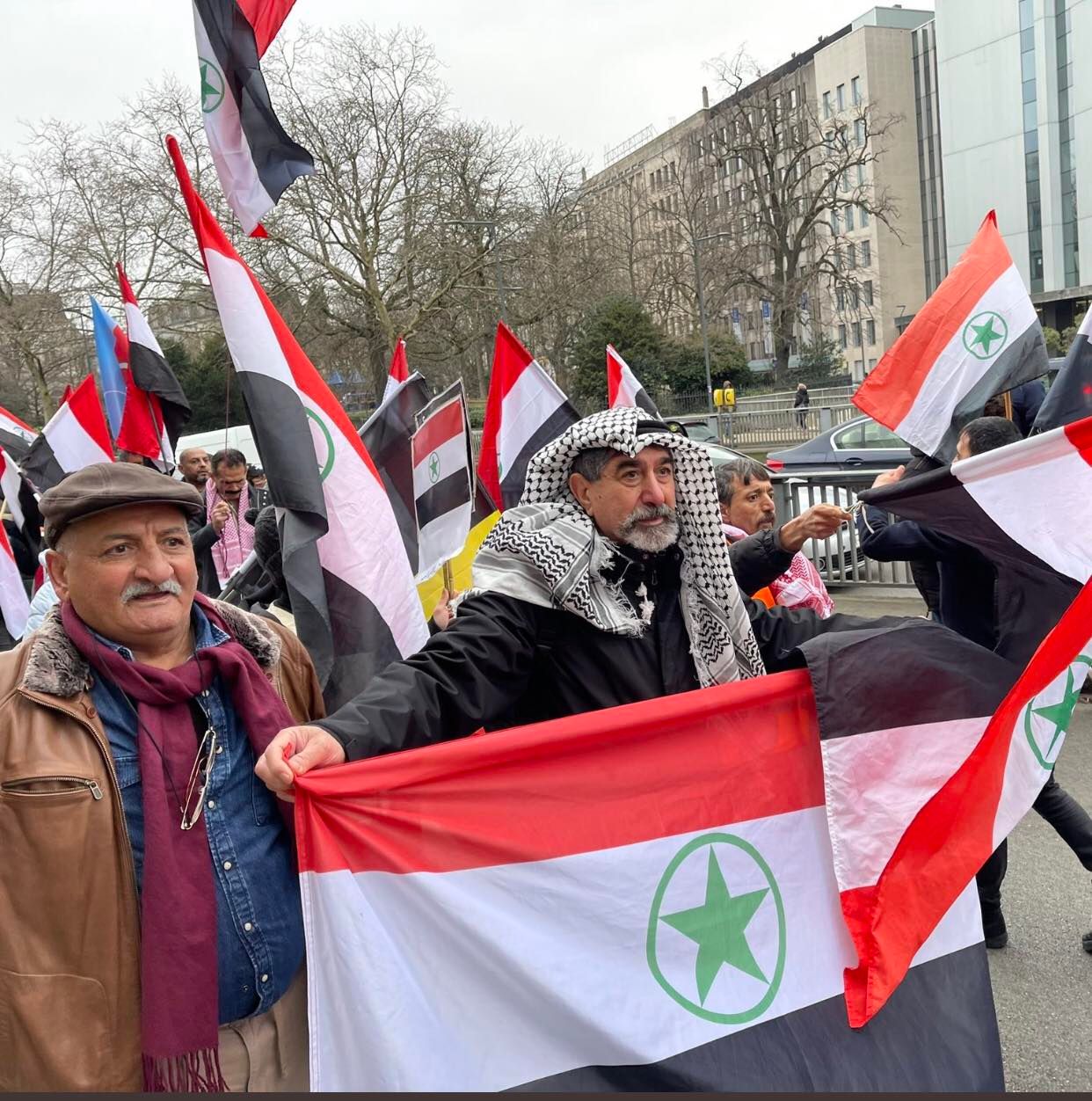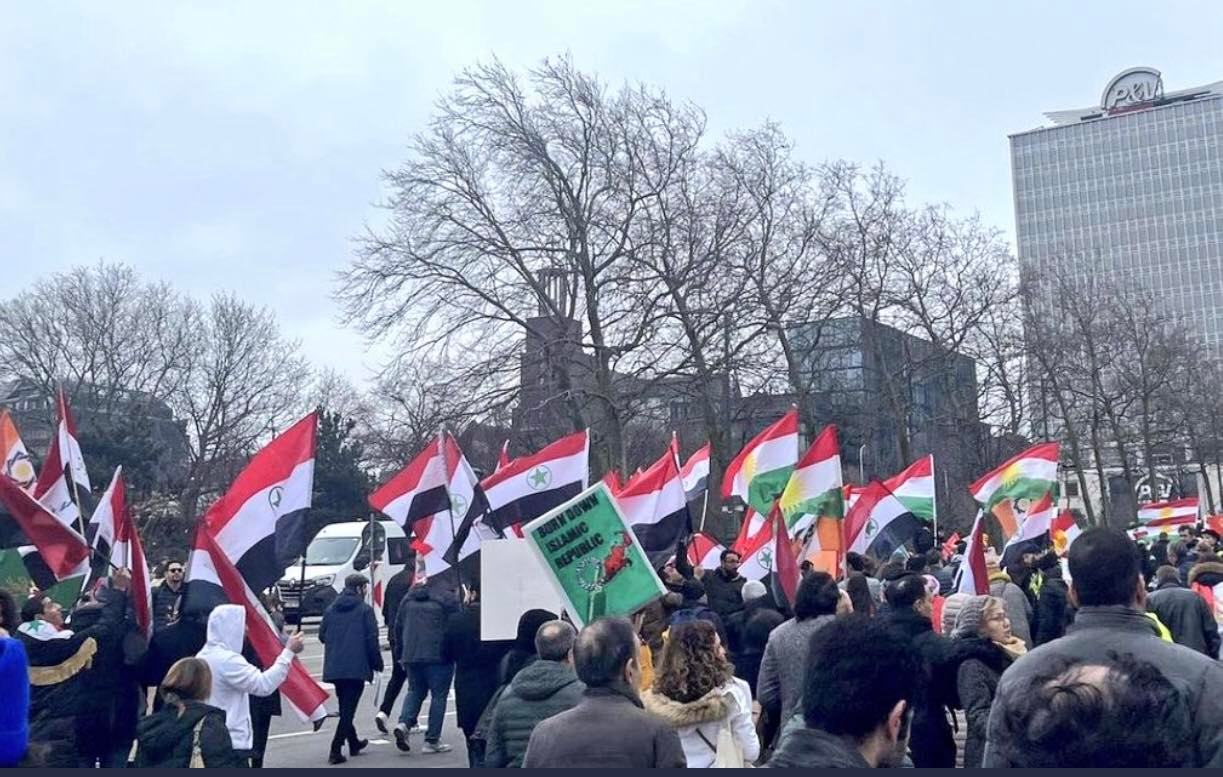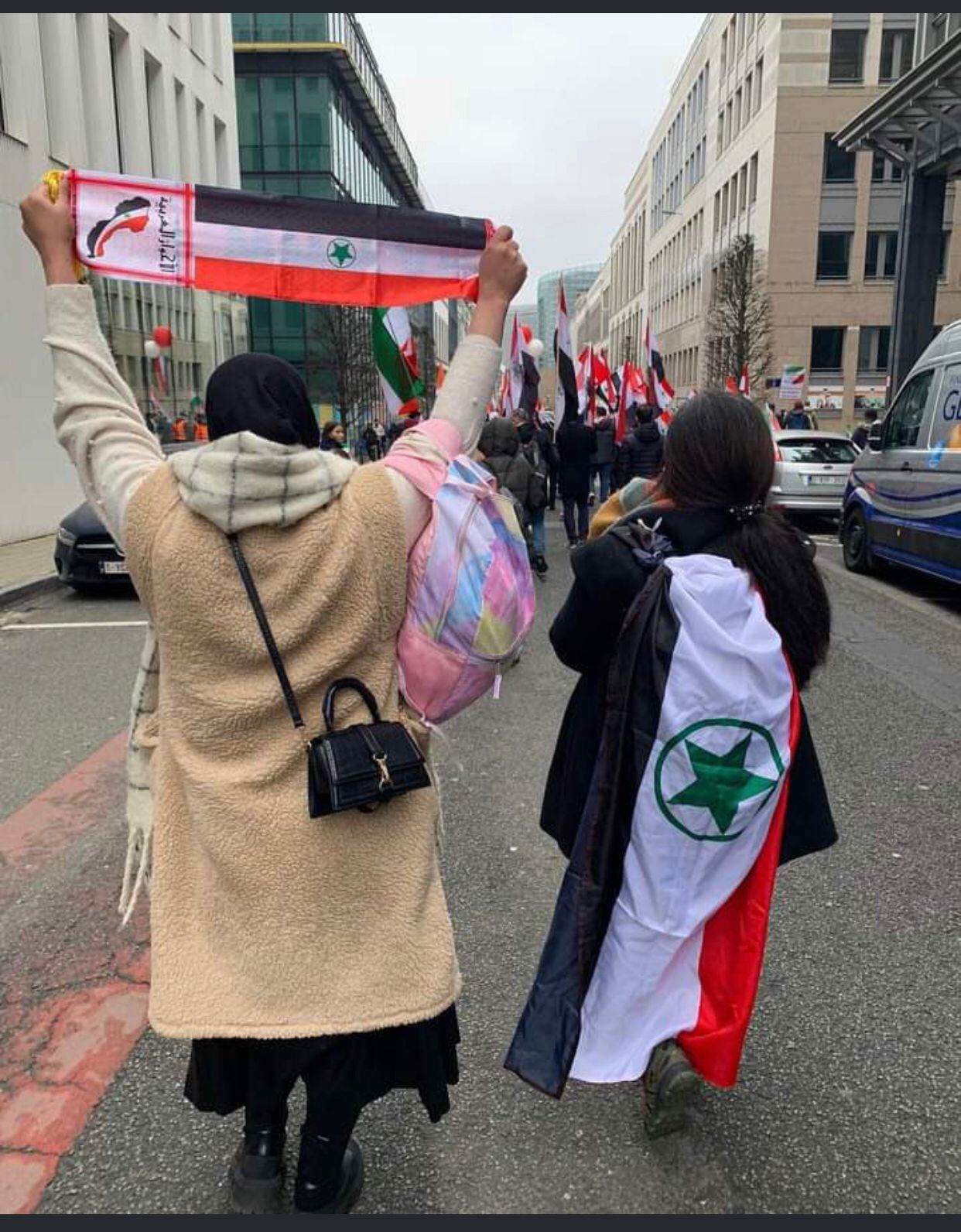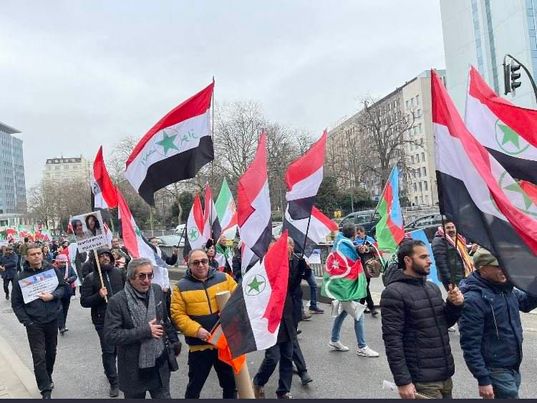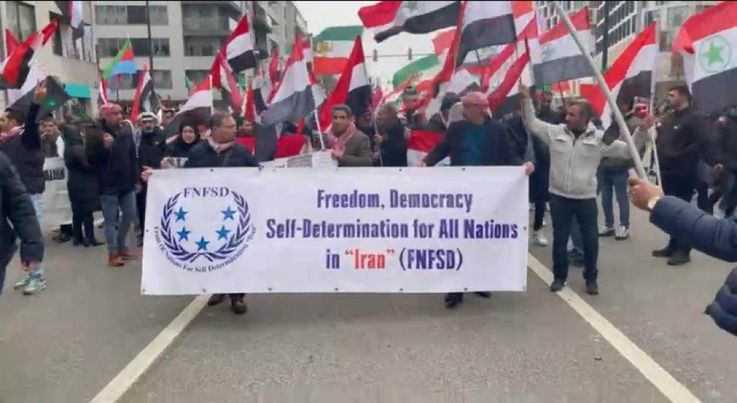Ahwazis reiterate solidarity with the struggle of all Iran’s national ethnic minorities and peoples opposing injustice, and call for IRGC to be classified as a terror organisation.
On February 20, 2023, thousands of members of Iran’s long-oppressed non-Persian ethnic minorities, including Azerbaijanis, Kurds, Balochis, Turkmen, and hundreds of Ahwazi Arabs, participated in a march and rally together with members of the country’s similarly oppressed religious minorities, and other supporters of freedom in Brussels, the capital of Belgium. The demonstrators demanded that the European parliament classify the regime’s infamous so-called Islamic Revolutionary Guard Corps (IRGC) as a terrorist organisation, adding it to the list of terrorist groups proscribed by the European Union.
Many Ahwazi activists took part in the large, peaceful march, raising the Ahwazi flag and chanting anti-regime slogans in Arabic and English slogans expressing their disgust at the IRGC’s policies and crimes, while also denouncing the efforts of representatives of the previous brutal dictatorship, headed by Shah Reza Pahlavi, to obstruct and hijack the protest movement by Iran’s peoples and use it for their own partisan ends to seize power again.
The Ahwazi Arab people were and continue to be among the worst affected by the IRGC’s atrocities and terrorism, a fact that the protesting activists have repeatedly emphasised to members of the European Parliament, as they did again today. At today’s rally, they and the other protesters demanded that the IRGC be added to the list of terrorist organisations by the European Union and the broader global community.
The Ahwazi diaspora’s participation in this event is a part of a recent series of protests, rallies and other events intended to draw attention to the Iranian regime’s and its predecessor’s racism towards non-Persian national ethnic minorities and the horrific human rights abuses carried out by both regimes against the non -Persian nations, who make up 70% of Iran’s population of Iran. The voices of colonised and oppressed indigenous non-Persian peoples within Iran, such as Ahwazi Arabs, Baluchis, Azerbaijanis, and Kurds, who have endured long decades of state-sponsored discrimination at the hands of successive Iranian dictatorships, have been shamefully stifled and ignored for too long and are unknown to the rest of the world; now they are demanding to be heard and to be supported in a historic struggle for freedom, dignity and democracy, ending the historic injustices against them.
Ahwazi demonstrators participated in the protests to express their solidarity with their own persecuted Ahwazi people at home in Iran, as well as with their Kurdish, Baluchi, Turkmen, Azerbaijanis and other fellow ethnic minorities and with religious minorities and other persecuted groups within Iran. Furthermore, they highlighted that Ahwazis continue to pay a particularly heavy price for renewing their uprising for freedom and justice, and for their rejection of the Iranian regime’s repressive and racist policies, with even more Ahwazi activists than usual currently being arrested, imprisoned, tortured, and killed simply for calling for freedom and human rights. The Ahwazi demonstrators also called for recognition of their right to self-determination and to their own regional autonomy.
Ahwazi people like Kurds, Azerbaijanis and Balochis continue to be targeted by Iran’s regime for arbitrary arrest, imprisonment and execution on fabricated political and national security-related charges at disproportionately high rates, in an effort by Tehran to terrorise dissidents into silence.
Ahwazi Arab, Balochi, and Kurdish and Azerbaijanis dissidents are routinely arbitrarily arrested, detained, and killed in connection with their involvement in a range of peaceful activities such as advocating for the right to their own cultural identity and their linguistic freedom; organising or taking part in protests; being affiliated with oppositional parties; campaigning against environmental degradation in their areas; or simply participating in non-regime-organised religious or cultural activities. In addition, women from Iran’s indigenous and national ethnic minorities supporting fundamental human rights, women’s rights, greater freedom and an end to unjust, discriminatory policies are frequently subjected to threats, harassment, arrests and imprisonment.
For non-Persian peoples, the simplest forms of anti-racist activism are often deliberately misconstrued by the authorities as a threat to national security, or charges conflated with separatism simply due to their support for regional autonomy or regional self-governance in their own regions. Such demands are often censored not only by the Iranian regime itself, but also by Persian dissident groups in exile.
There is no apparent awareness among many Persian-Iranian activists of the dichotomy between claiming to be engaged in a struggle to bring democracy to Iran while simultaneously denying the national and cultural rights of Ahwazi, Azerbaijani Turks, Kurds, and Balochis, with many Persian-Iranians using the same offensive stereotypes, ethnic slurs and racist language as the current and previous regime to label Ahwazis and other national ethnic minority activists from these long-decades colonised nations as threats to Iran’s territorial integrity for demanding decentralisation of Iran’s future government and putting an end to the legacy of the Persian nation-state structural ethnic oppression that has committed the worst ethnic oppression against these people since its formation.

